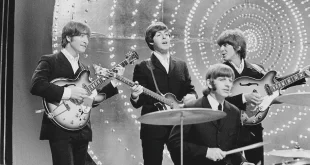Every date in Beatles history offers a fascinating glimpse into the journey of the world’s most influential band. From chart-topping records to historic music rights deals, August 10 holds a mix of triumphs, creative milestones, and even controversies.
Let’s explore what happened on August 10 in Beatles history across the decades.
1963 – “Please Please Me” Holds the Top Spot for the 14th Week
On August 10, 1963, The Beatles’ debut album “Please Please Me” continued its extraordinary run at the top of the UK Record Retailer chart, marking its 14th consecutive week at number one. This early success was a sign of the cultural wave the band had set in motion.
Featuring classics like “I Saw Her Standing There” and “Love Me Do”, the album captured the fresh, energetic sound that would define the early 1960s and launch Beatlemania into full force.
1964 – Vee Jay’s Final Beatles Singles Release in the U.S.
In the U.S., August 10, 1964, saw Vee Jay Records making one last commercial push with their Beatles catalogue. The label released four singles simultaneously:
- Do You Want to Know a Secret / Thank You Girl
- Please Please Me / From Me to You
- Love Me Do / P.S. I Love You
- Twist and Shout / There’s a Place
This mass release came as Vee Jay’s rights to The Beatles’ recordings were expiring, following a long legal battle with Capitol Records. These singles remain collectible treasures for Beatles vinyl enthusiasts.
1966 – “Yellow Submarine” and “Eleanor Rigby” Enter the UK Charts
August 10, 1966, brought another triumph: The Beatles’ double A-side single “Yellow Submarine” and “Eleanor Rigby” stormed into the UK New Musical Express charts.
- Yellow Submarine debuted at number 1, an instant fan favorite for its whimsical, sing-along charm led by Ringo Starr.
- Eleanor Rigby entered at number 2, showcasing Paul McCartney’s lyrical storytelling and George Martin’s groundbreaking string arrangement.
Together, the two songs highlighted The Beatles’ incredible range — from playful pop to haunting, poetic ballads.
1968 – A Day with Capitol Records’ President
On August 10, 1968, all four Beatles, along with Yoko Ono and Stan Gortikov, the president of Capitol Records in the USA, enjoyed lunch at London’s Ritz Hotel.
Later that day, John and Yoko took Gortikov to see the play “Halfway Up the Tree” at the Queen’s Theatre. These meetings underscored the close relationship between The Beatles and their U.S. label, a partnership crucial to their global success.
1972 – Paul McCartney Arrested in Sweden
The evening of August 10, 1972, took a dramatic turn for Paul McCartney and Wings. After performing at the Scandinavian Hall in Gothenburg, Sweden, Paul, Linda McCartney, and drummer Denny Seiwell were arrested for marijuana possession.
While not the first or last time Paul faced such legal trouble, the incident became one of the more infamous moments of the Wings era, reflecting the countercultural attitudes that lingered after the ’60s.
1983 – “The Beatles at Abbey Road” Exhibition Continues
On this date in 1983, Abbey Road’s legendary Studio 2 hosted three more showings of the exhibition “The Beatles at Abbey Road”. Fans were given a rare opportunity to stand in the same space where so many iconic songs were recorded. For many, it was the closest they could come to stepping into Beatles history itself.
1985 – Michael Jackson Buys the Beatles’ Song Catalogue
Perhaps the most commercially significant event on an August 10 came in 1985 when Michael Jackson purchased ATV Music for $47.5 million. This deal made him the owner of the Northern Songs catalogue, which included the publishing rights to most of The Beatles’ songs written by John Lennon and Paul McCartney.
The sale was controversial, with McCartney publicly expressing disappointment over losing control of his own compositions. Yet it remains one of the most famous music rights transactions in history.
Why August 10 Is a Notable Date in Beatles History
From chart dominance in 1963 to historic legal and business moves in the 1980s, August 10 captures a broad spectrum of The Beatles’ journey — music, fame, business, and personal drama. It’s a reminder that the band’s influence wasn’t limited to the recording studio or the stage; it extended into law, commerce, and global culture.





